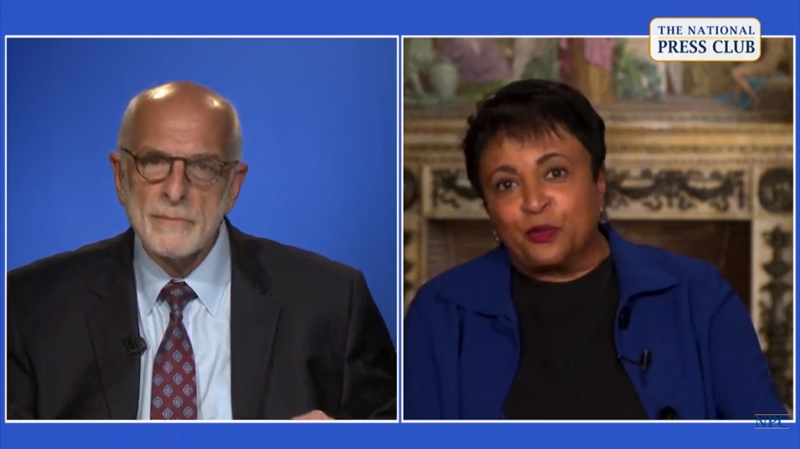Library of Congress moves National Book Festival online

The Library of Congress realized in March that its signature celebration, the National Book Festival, couldn’t take place in-person in a pandemic, Carla Hayden told a National Press Club Virtual Newsmaker Friday. Instead, the head of the world’s largest library said its annual event would run online September 25-27 at www.loc.gov where viewers can connect with more than 100 of the nation’s best authors, poets and illustrators who plan to discuss their work and take questions.
“You will go into the studio of John Grisham and see where he creates his works,” Hayden, the 14th Librarian of Congress, told Club President Michael Freedman who introduced her. "Virtual visitors will be able to talk with Dav Pilkey, award-winning children’s author and illustrator, and interact with Colson Whitehead [Pulitzer Prize winning author and 2020 recipient of the Library of Congress Prize for American Fiction] who wrote Nickel Boys and The Underground Railroad and meet more writers online. The 20th annual book festival’s theme is “inspiration and ingenuity.”
As a trusted research arm for the U.S. Congress, the library has added resources for teachers and parents: lesson plans, town halls, webinars—and for other viewers who want virtual tours of its collections or a nature walk with Walt Whitman. The library has a program for teaching with primary resources and provides workshops to help educators navigate their virtual environment, for example by turning items from the Wright Brothers’ flying designs into math problems for schoolchildren.
Hayden confronts a time when the new normal requires institutions, including her own, “to rethink their relationships with their constituencies and implement new digital and virtual approaches to keep art, music, literature and poetry in our daily lives," Freedman said.
The first woman and first African-American to lead the library, Hayden said the library is committed to using “technology to its fullest” so collections can be made more widely available. She cited a “watch party” for the Hamilton musical where the Library joined with the Smithsonian, the National Archives and the New York Public Library with its extensive collection of Alexander Hamilton’s papers, and shared them online.
“Libraries are more than just books,” Hayden said, “and closing them is most difficult for people who need trusted resources and places to be.” People go there to get on the Internet and look for jobs, and get health information, she said, so being creative in a pandemic is essential for libraries now like offering curbside service, or loaning musical instruments and even sewing machines, and using drones to deliver materials. So is reaching out through all social platforms.
”The voices of history are just as important as reading the text,” said Hayden after a question about the library’s vast radio and audio holdings. The library is the repository and caretaker for StoryCorps where people relate their own experiences.
“There’s another oral history project, The Veterans History Project, which has expanded to include Gold Star families,” Hayden said.
The library also houses the U.S. Copyright Office.
Many have called slavery the original sin of this country, Freedman said in a question about a need to revise our history. For Hayden, the key word is “review” --reviewing our history in the context of today: “Let the books battle it out [our history] on the shelves,” she said. “With Lonnie Bunch [Secretary of the Smithsonian Institution], we talk about ‘the hope in history.’’”
To a former House staff member’s question on access, Hayden replied that the library provides information to any member of Congress or staff: “objectivity” is the library’s watchword.
The nation’s library has 836 miles of shelving, Hayden said, the papers from 23 presidents and 36 Supreme Court justices, Rosa Parks hand-written letters, the world’s largest law library and the largest collection of bibles and comic books among its millions of holdings. Half of its collection is in languages other than English. Unusual items live there too, like lots of hair (Beethoven’s as one example) and the contents of Abraham Lincoln’s pockets on the night he was assassinated.
Freedman asked Hayden about those pockets. She said she saw: Two pairs of spectacles, a device to clean them that looked modern, a handkerchief with Lincoln’s initials, a billfold with a 5 dollar Confederate bill (he’d been to Richmond recently) and about six well-worn newspaper articles not complimentary about him, and a button that had fallen from his jacket.
Hayden is the first professional librarian to lead the Library in more than 60 years as it celebrates its 220th anniversary. She was appointed by former president Barack Obama in 2016.
